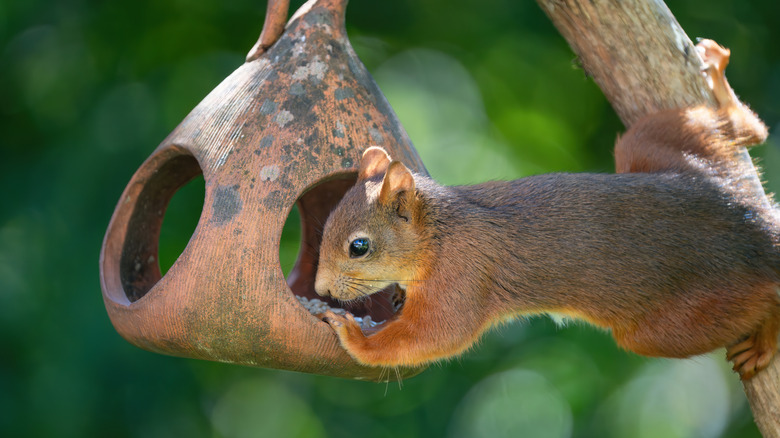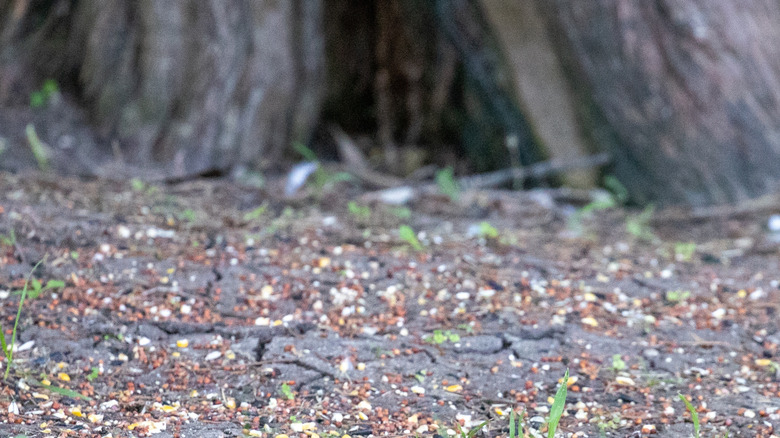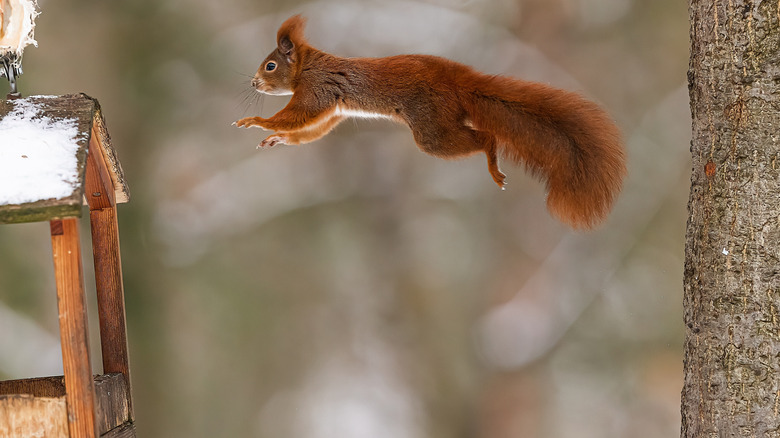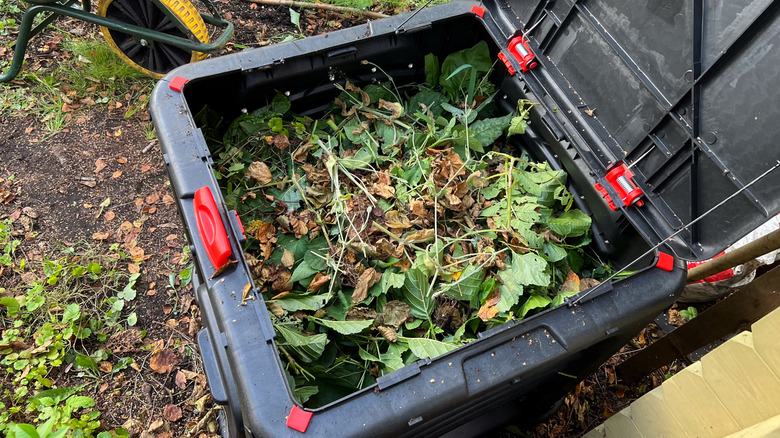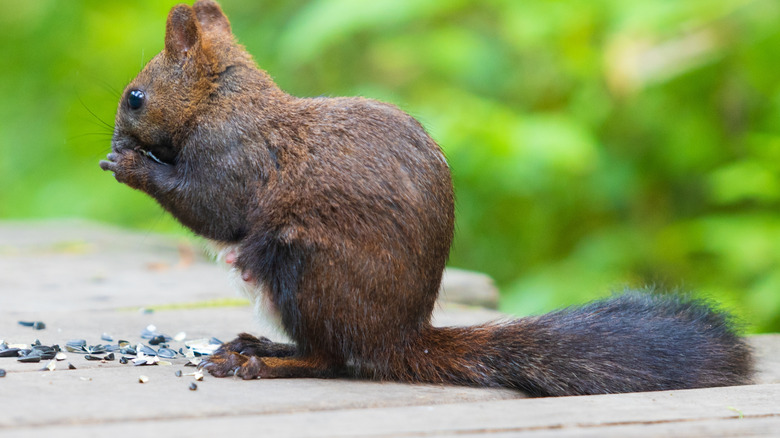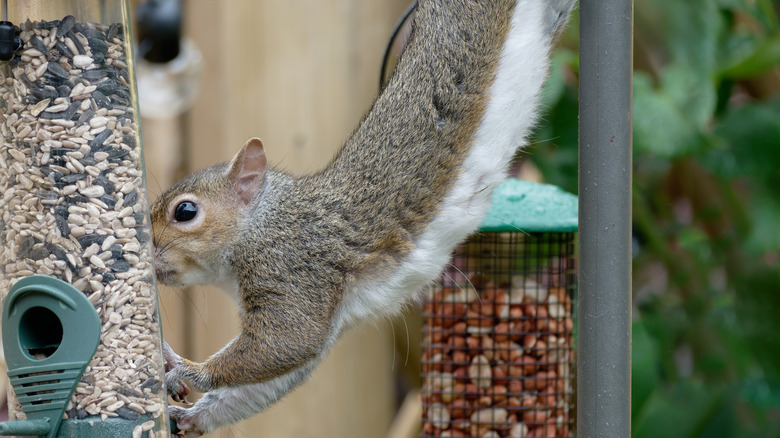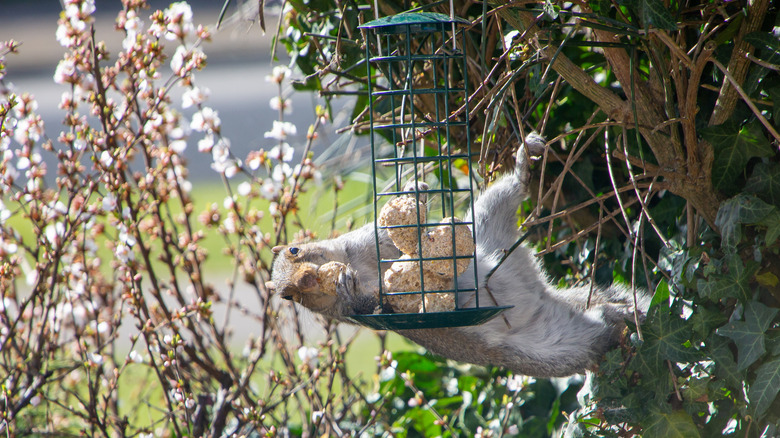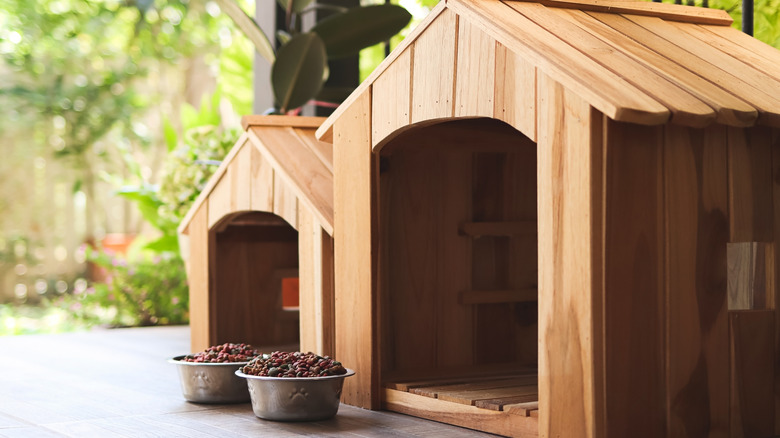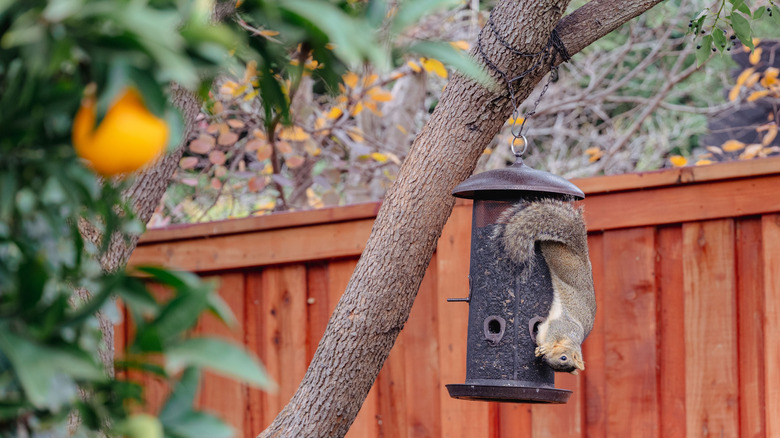Common Mistakes That Are Attracting Squirrels To Your Bird Feeder
We may receive a commission on purchases made from links.
When you're looking to attract birds to your backyard and help ensure that their nutritional needs are being met, one of the best things that you can do is to hang a bird feeder. Watching the birds flock to snack on the seeds that you've purchased for them can be a very rewarding experience. However, when you look out the window expecting to see a few birds snacking, but instead spot a pesky squirrel stealing their seeds, it can be exceedingly frustrating. If it seems that no matter what you do, the rodents are still gaining access to the food, you may be making one of the many key mistakes.
These mistakes can inadvertently attract squirrels to your bird feeder. They can make it easier for them to snack on the seeds that are meant for your feathered friends, not your furry ones. Fortunately, many of these mistakes can be avoided by making a few changes to your feeding routines, bird feeder placement, and other key variables. Here, we'll share what you need to stop doing, and what you should be doing instead, to keep those squirrels away from your feeders once and for all.
Allowing leftover seeds to accumulate on the ground
Birds can be messy eaters sometimes. As they munch on the seeds in the bird feeder, some will almost certainly drop to the floor. Despite their affinity for the seeds, the birds are probably not going to go down to the ground to gobble up the ones that drop. But, do you know who will happily seize the opportunity for a quick bite? That's right, those pesky squirrels. They'll see those dropped seeds as a welcome invitation. And, once they get a taste from the ground and realize that there's an all-you-can-eat buffet of the same goodness right over their heads, they'll be chowing down from your feeders in no time. This common bird feeder mistake can also attract other pests, such as raccoons, to the feeder as well.
Now that you can see the connection between dropped seeds and attracting pesky critters to your feeders, the next steps may be pretty obvious. This commonly overlooked solution to keep squirrels out of bird feeders is simple. Instead of allowing the dropped seeds to accumulate on the ground, make cleaning the area up part of your regular routine. With fewer seeds on the ground, the squirrels are less likely to be drawn to the area of the feeder in the first place. Moreover, if the plants under your bird feeder are suffering, it could also be caused by the accumulating seeds and hulls. Sunflower seeds are toxic to some plants, so this is yet one more reason to keep the area under your feeders clean.
Placing the bird feeder near jump-off points
You can also make a mistake by choosing the wrong spot in the yard to hang your bird feeder. The easier it is for the squirrels to access, the more attractive it is going to be for them. Therefore, you should avoid hanging it near any jump-off points that they can use to get to it with minimal effort. This means that you'll want to keep the bird feeder away from trees or other ledges.
Squirrels are very agile and can jump far distances. So, aim to position the feeder at least 10 feet from anything that could serve as a jumping-off point. Once you pick a location for a bird feeder, there's one more thing you can do to further limit the chances of the critters getting to it. Choose the pole material carefully. Avoid a material like wood, which they will be able to scale easily. Instead, keep squirrels off your feeders with a simple swap like making a DIY feeder pole using slick PVC pipes. You might also consider buying a pole with an integrated deterrent, such as this 80-inch Bird Feeder Pole with Squirrel Baffle.
Placing the feeder near garbage cans or a compost pile
Birdseed that has dropped to the ground near the feeder isn't the only source of food that may be attracting squirrels and alerting them that there's more to be had. If you have your bird feeder near your garbage cans or backyard compost pile, it can have the same effect. Squirrels are known as opportunistic foragers. If there is an opportunity to eat, even if it isn't something that is part of their normal diet, they'll jump at it — often literally. So, if you have a compost pile or trash cans with food scraps in the vicinity of your bird feeder, the squirrels will almost certainly be stopping by to check it out. And, as they do, they'll have a better chance of realizing that the feeder is there with even more food for them to enjoy.
Aim to keep your bird feeder away from these other potential squirrel attractants. This way, if they do stop by to graze from your compost pile or dig through the trash can, they won't spot the additional food source in the same area. Additionally, you can further limit how attractive your yard is to squirrels by covering your trash cans and compost bin.
Choosing seeds that squirrels love
Did you know that the type of seeds you're choosing to add may be making your bird feeder more attractive to the pesky rodents? Squirrels are particularly fond of some common bird food offerings, including sunflower seeds and peanuts. The larger size of these items makes them much easier for squirrels, who hold their food with their paws, to enjoy them. So, if you're filling your bird feeder with sunflower seeds, peanuts, or other larger seeds, they're likely to see it as the perfect spot to stop and grab a quick bite.
Instead of dishing up their favorites, consider repelling squirrels from your bird feeder by using seeds they can't stand. Safflower is one seed that you might consider. Squirrels don't like its taste, so they're less likely to be attracted to a bird feeder that is filled with it. However, safflower seeds will still deliver beneficial nutrients to your feathered friends. It's a good source of fat and protein that gives birds the energy they need to survive.
Nyjer is another seed that squirrels are not particularly fond of. If you've ever seen nyjer seeds, then you know that they're basically little slivers. Because of this, the seeds can be very challenging for the critters to pick up and manipulate with their paws in order to eat them. That being said, if squirrels are hungry enough, they'll eat anything. So, if there are no other sources of food readily available, they'll take the added time and effort to get the nyjer seeds in their mouths and will deal with the less-than-pleasant flavor of the safflower seeds.
Overfilling the feeder
Keeping up with adding new seed to your feeder can be a challenge. It may be tempting to add some extra to top it off every time the seeds have been emptied. You might think that doing so will help ensure that the birds have a good source of food for a longer period of time and that you won't have to interrupt your schedule as frequently to refill it. However, overfilling a bird feeder isn't a good idea, especially if you're trying to avoid attracting squirrels to it. With an overabundance of food, they're more likely to take the opportunity to get to it. Plus, they might see it as a good source of food to keep returning to.
So, when you refill your bird feed, resist the urge to add as much seed as you can fit. Only add enough to nourish the birds in your yard for two or three days, and then refill it as needed. If there isn't a ton of food, the squirrels won't view the feeder as such a prime food source and will be more likely to move on to find something better. Additionally, only adding a few days' worth of food at a time will also be the safest option for the birds you do want to feed. Seed that sits in the feeder for weeks on end is more likely to grow mold or become otherwise spoiled. As you can imagine, consuming such food could cause the birds that eat it to become ill.
Putting the feeder near quick cover
While squirrels spend much of their time searching for and gathering food, they also have to be cognizant of their safety when doing so. They'll try to avoid leaving themselves out in the open with nowhere to run if a predator approaches. For this reason, placing your bird feeder in a part of the yard that provides them with ample cover, such as near thick bushes or a pile of wood or brush, is a mistake. When the feeder is placed in a location like this, it will let the squirrel know that if they get up to the feeder to steal the food, they will have a nearby place where they can quickly escape for cover.
Instead, deny the creatures the cover that will make your bird feeder look like a more appealing option. Try to place the feeder as far out in the open as possible. Keep it away from any bushes, trees, or decking that the squirrels could quickly retreat to with some treats from the feeder. Keep in mind that the comfort and shyness levels may vary based on where you live and what the squirrels in your yard are used to. For example, if you live in a busy city, the rodents are likely more accustomed to a lot of noise and movement than those who live in the country.
Hanging the feeder near pet food
If you feed your pets outside (or have any farm animals), hanging your bird feeder near the animal food could be a mistake that ends up attracting squirrels to it. As mentioned, these animals are opportunistic feeders, so they'll eat practically anything if they're hungry enough and it's readily available. This includes pet food. If the squirrels are attracted to your pet food, and it's close to the bird feeder, they're going to see the entire area as a nice little buffet that they should continue returning to.
So, if you feed your dog, cat, or any farm animals outside, choose a location as far away from the food bowls or bags as possible. This way, even if the squirrels are attracted to the animal's food, they won't see the birdseed in the feeder as yet another reason to frequent the area. Picking up the bowl after your animals have finished eating and making sure that their extra food is stored in a tightly sealed container can go even further towards making your yard as a whole less appealing to squirrels. This could further reduce the chances that they'll discover your bird feeder.
Hanging your feeder near fruit trees or berry bushes
As you've probably gathered by now, squirrels are not picky and are attracted by many different food sources. Placing your bird feeder near anything that they may view as a source of food will only increase the chances of them finding it. So, it might not come as a surprise that you should also avoid placing your bird feeder near any berry bushes or fruit trees that you have in your yard. Squirrels will not pass up the chance to sneak some fresh fruit from these trees or bushes, or anything that's dropped to the ground. So, if your bird feeder is right there too, they may identify it as one more option to satisfy their appetites and foraging needs.
If you have a bird feeder near your fruit trees, move it ASAP to avoid attracting squirrels. Additionally, if you have a vegetable garden, you'll want to keep the birdseed away from it for the same reasons. Depending on the size of your backyard, you might need to get creative about where to place the feeder to keep it away from these various items. You could consider a spot in the front yard, where you're less likely to be growing food and may have more open space, especially if you have a front porch to enjoy the visiting birds.
